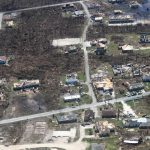CARICOM SG Rallies Community to Take Strong Stand Against Gender-Based Violence

Message from the CARICOM Secretary General on the 16 Days of Activism Campaign Against Gender-Based Violence
Almost two decades ago, the United Nations General Assembly (UNGA) adopted resolution 54/134, officially designating 25 November as the International day for the Elimination of Violence Against Women. However, since 1981, women’s rights activists have observed the day to advocate against gender-based violence.
In 1991, the first Women’s Global Leadership Institute set aside 16 days to bring the issue of violence against women and girls, and its adverse effects under the microscope. The 16-day period highlights four important observances, starting with the International Day for the Elimination of Violence against Women and Girls on 25 November, Women’s Human Rights Defenders Day on 29 November, World AIDS Day on 1 December, with the campaign ending on Human Rights Day on 10 December.
This year’s theme is: “Orange the World: Generation Equality Stands Against Rape”!
The 16 Days of Activism Campaign is a time to galvanise action to end gender-based violence against women and girls around the world, including sexual violence and rape, which is one of the most repugnant affronts to human dignity and the range of dignity-related rights.
UN Women reminds us that rape is rooted in a complex set of patriarchal beliefs, power and control that continue to create a social environment in which sexual violence is pervasive and normalised. Exact numbers of rape and sexual assaults are notoriously difficult to confirm, due to frequent latitude and impunity for perpetrators, stigma towards survivors and their subsequent silence.
Despite the adoption of the Convention on the Elimination of All Forms of Discrimination against Women (CEDAW) by the UNGA in 1979, the second most ratified instrument globally, violence against women and girls remains a pervasive problem worldwide.
A recently released Programme Needs Assessment of National Gender and Women’s Machineries, conducted in May 2019 by the Caribbean Development Bank and the CARICOM Secretariat, bears out this fact. All 14 Gender Bureaux/Machinery respondents cited gender-based violence as an area where much work has been done as an important priority in their country, yet some significant gaps remain to be filled. Economic empowerment was second, followed by women’s political participation and gender mainstreaming. These are consistent with the areas that the CARICOM Region prioritised following the Fourth World Conference on Women (Beijing, 1995) and has worked on for almost 25 years, with very slow, uneven progress.
A major step in filling these gaps and accelerating progress will be realised by the Spotlight Initiative. So named, because it brings into sharp focus, gender-based violence while strengthening efforts to eliminate the scourge. The European Union (EU) and other partners have allocated millions of Euros to five regions of the world to eliminate violence in all its forms. The Caribbean has received funds to work in the area of eliminating family violence.
Around the world, rape and sexual abuse are everyday violent occurrences, affecting close to a billion women and girls over their lifetimes, both in times of peace and war. However, despite the pervasiveness of these crimes, laws are insufficient, inconsistent or not systematically enforced. Specific laws against gender-based violence are not universal. In 49 countries there is no specific law against domestic violence, in 45 there is no legislation to address sexual harassment and 112 countries do not criminalise marital rape. The only country in the Caribbean Community (CARICOM) that does, is Trinidad and Tobago.
It is important to reiterate that the 57th Session of the Commission on the Status of Women held in 2013, noted the economic and social harm caused by such violence and strongly urged all governments to collect, collate, analyse and disseminate reliable and comparable data and statistics on a regular basis, disaggregated by sex and age at the national and local levels. Data are needed on different forms of discrimination and violence against women and girls, along with multidisciplinary research and analysis in order to inform the development, revision and implementation of laws.
I am happy to report that with the collaborative efforts of UN Women, the United Nations Development Programme (UNDP), the CARICOM Secretariat and several other International Partners, Prevalence Surveys on Gender-based Violence have been conducted in the CARICOM Region for the first time. Both Suriname and Guyana launched their Prevalence Surveys almost two weeks ago; bringing to four, the number of Prevalence Surveys conducted in the Region so far. Trinidad and Tobago, and Jamaica were the first to launch. Grenada will launch its survey in 2020. The CARICOM Secretariat will also prepare model comprehensive legislation to address Sexual Harassment in 2020.
As we mark the 16 Days of Activism Against Gender-Based Violence, I call on the people of CARICOM, especially our men and boys, to take a strong stand against gender-based violence and, by extension, rape and sexual assault. Our women and girls have a right to enjoy the full complement of their human rights.
Source: CARICOM TODAY

 Previous Post
Previous Post Next Post
Next Post